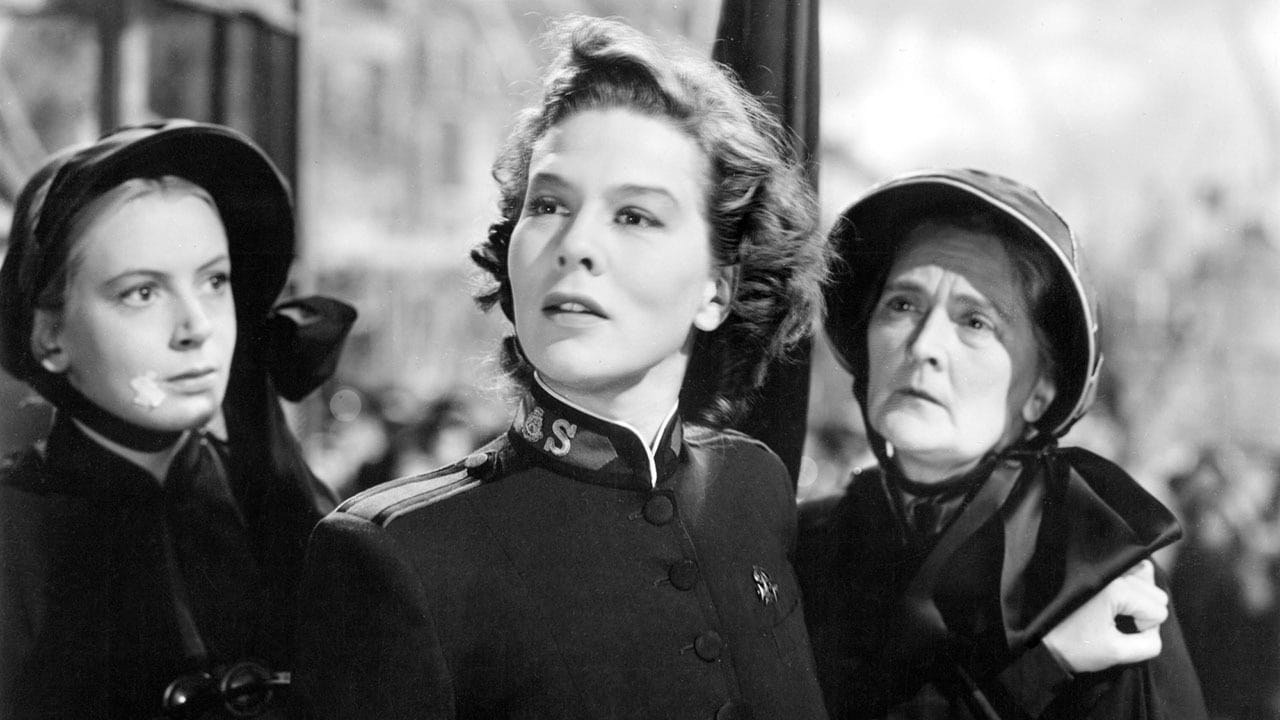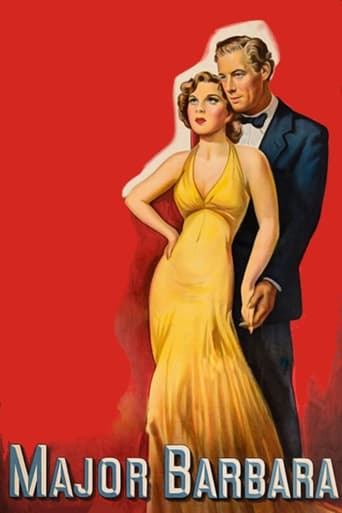

Lack of good storyline.
... View MoreDon't listen to the negative reviews
... View MoreA Brilliant Conflict
... View MoreI think this is a new genre that they're all sort of working their way through it and haven't got all the kinks worked out yet but it's a genre that works for me.
... View MoreThis is from a play by George Bernard Shaw. Now I know that Shaw is like a god to some, but I didn't particularly like this film. I found it to be immensely talky and a bit dull. I know that makes me a peon, but I just thought everyone talked way too much and it all felt very stagy--too stagy for a movie. And, even the talents of Wendy Hiller, Rex Harrison (wow, did he talk and overact here) and Robert Morley aren't enough to make this one interesting.Major Barbara is the title given to the daughter of a rich industrialist. She's in the Salvation Army and loves the life--and talks about it so endlessly you want to slap her. Then, inexplicably, she loses her faith very quickly and in the end comes to embrace the life of a man who is an executive in a munitions factory. There's a bit that happens in between and frankly it lost me because of its style. I could tell it was all meant to be immensely clever--yet none of it seemed very real or interesting. Sorry, but I guess I am a lout for not loving this film.
... View MoreI'm surprised that this wonderful classic from the British cinema ever got made at the time it did. Not with having one of the major characters of the play being a munitions manufacturer. Not so very long ago munitions makers were a despised lot of people and in Major Barbara, Robert Morley's character of Edward Undershaft is admirable only for the realistic way he views life.People in his profession were characterized as 'merchants of death' and were held in low repute until they were needed when the United Kingdom was fighting for its survival again. Morley's Undershaft does not redeem the name of the profession.Major Barbara was first presented on the London stage in 1905 and waited 10 years before it made its Broadway debut in 1915. Europe had a general post Napoleonic peace for nearly 100 years and war was unthinkable. The arms merchants such as they were busily made their product and the countries armed more and more. But it was thought that the guns might be used in their various colonial endeavors. When they started getting used against each other in a World War, pacifism became very popular.But in Major Barbara its author George Bernard Shaw had a different idea in mind. I think his chief reason for writing the play was to illustrate one of Karl Marx's tenets that religion was the opiate of the masses. Shaw was a Fabian socialist and wanted to see socialism come to the United Kingdom by peaceful means. But he wouldn't have disagreed with that part of Marx's diagnosis about the ills of society. He lived until 1950 and saw the post war Labour government do much of what he advocated back in the day. One wonders what he would think now of British, indeed western society in general.Morley who has been estranged from his family for years returns and finds his eldest daughter Barbara played by Wendy Hiller a Salvation Army worker in the London slums. She thinks of herself as repudiating her hated father's evil works by doing good. He finds the idea of visiting her at the mission and showing her the error of her ways as he views it.Religion then as now needs money, why are the televangelists out there begging for your currency to keep their work afloat? The Salvation Army does do a limited amount of good with their soup kitchens and blandishments against indulging too much in the vices. But what Shaw and his fellow Socialists would argue is that without a real living wage and the workers having some say in production, all this does is just keep the workers at bay with dreams of a perfect life in the next world no matter how bad this world might be for them. Major Barbara is one of Shaw's greatest polemical work and in the characters of Undershaft and Barbara he pits the material against the spiritual and the material wins in a knockout. This production has some really good casting beginning with Hiller and Morley. Rex Harrison gets one of his early cinema roles as scholar Adolphus Cusins who Morley also bends to his point of view and uses the mutual attraction of Hiller and Harrison for each other for his own ends. Deborah Kerr makes her screen debut as an innocent new salvation army lass and Emlyn Williams and Robert Newton as a pair of working class types who work the system so to speak.Major Barbara is a play set firmly in its time, I doubt it could be updated, mainly because we've passed from the Industrial Age to the Information Age because of the computer. At least that's what the sociologists will tell you. New problems have arisen and for myself I don't think the organized labor movement has quite got a handle on them. Still this fine production raises questions that we should all think seriously about.
... View MoreI just received the Eclipse Series collection which includes Major Barbara. I was familiar with a version of the movie that PBS (WNET-13 in New York) used to show. I was disappointed to see that scenes had been cut. Perhaps my favorite is after Undershaft negotiates his deal with cusins they talk about the True faith of an Armorer. What follows is a tour of Undershaft's ancestors. The DVD version I received cut this scene out. Does anyone know why or if there is an earlier version of the movie with that scene intact? Did anyone else pick that up?BARBARA. Is the bargain closed, Dolly? Does your soul belong to him now?(THE MOVIE NOW CUTS OUT HERE) CUSINS. No: the price is settled: that is all. The real tug of war is still to come. What about the moral question?LADY BRITOMART. There is no moral question in the matter at all, Adolphus. You must simply sell cannons and weapons to people whose cause is right and just, and refuse them to foreigners and criminals.UNDERSHAFT No: none of that. You must keep the true faith of an Armorer, or you don't come in here.CUSINS. What on earth is the true faith of an Armorer?UNDERSHAFT. To give arms to all men who offer an honest price for them, without respect of persons or principles: to aristocrat and republican, to Nihilist and Tsar, to Capitalist and Socialist, to Protestant and Catholic, to burglar and policeman, to black man white man and yellow man, to all sorts and conditions, all nationalities, all faiths, all follies, all causes and all crimes. The first Undershaft wrote up in his shop IF GOD GAVE THE HAND, LET NOT MAN WITHHOLD THE SWORD. The second wrote up ALL HAVE THE RIGHT TO FIGHT: NONE HAVE THE RIGHT TO JUDGE. The third wrote up TO MAN THE WEAPON: TO HEAVEN THE VICTORY. The fourth had no literary turn; so he did not write up anything; but he sold cannons to Napoleon under the nose of George the Third. The fifth wrote up PEACE SHALL NOT PREVAIL SAVE WITH A SWORD IN HER HAND. The sixth, my master, was the best of all. He wrote up NOTHING IS EVER DONE IN THIS WORLD UNTIL MEN ARE PREPARED TO KILL ONE ANOTHER IF IT IS NOT DONE. After that, there was nothing left for the seventh to say. So he wrote up, simply, UNASHAMED.CUSINS. My good Machiavelli, I shall certainly write something up on the wall; only, as I shall write it in Greek, you won't be able to read it. But as to your Armorer's faith, if I take my neck out of the noose of my own morality I am not going to put it into the noose of yours. I shall sell cannons to whom I please and refuse them to whom I please. So there!UNDERSHAFT. From the moment when you become Andrew Undershaft, you will never do as you please again. Don't come here lusting for power, young man.
... View MoreOne of my all-time favorite films, "Major Barbara" is a cinematic Shavian gem that stands alongside the original "Pygmalion", "Caesar and Cleopatra" and "The Devil's Disciple". Many viewers regard this as a rather verbose comedy-drama but then, as with Plato, dialogue was always what Shaw was all about. And what dialogue! There are more fireworks in ten minutes of "Major Barbara" then can be found in entire movies made nowadays, and without a single explosion or car chase! But then, like all Shaw dramas, this is a story about ideas, not about action. Although Major Barbara (Windy Hiller) is the title character, the real center of the story is her father, munitions tycoon Andrew Undershaft, played brilliantly by a fairly young, and uncharacteristically lean, Robert Morely. It is he who really moves the progress of the story, just as he has controlled the courses of the lives of his family in absentia for the past twenty years without their even being aware of it. As Barbara smugly repudiates his attempts to contribute his tainted money to save her Salvation Army mission, he ironically reminds her fiancée (and the audience) that she has actually accepted a great deal of it already. In fact, she has been living off his tainted money all her life. Tricked out with a Mephistophelean beard (he is constantly referred to as the "Prince of Darkness, and even his name seems redolent of Hell), Undershaft tempts his daughter and prospective son-in-law to abrogate their life in the Salvation Army for his life in the munitions business. Undershaft proposes to spend a day in Barbara's Salvation Army mission if she'll agree to spend a day at his munitions works. She agrees because, in her religious zeal, she's convinced she can convert her father. The worldly Undershaft, on the other hand, is equally sure that he can wean his daughter away from a life he perceives as a waste of her time and talent for one where he feels she can really make a difference. Whether viewers perceive Shaw's story as cynical or realistic depends upon their point of view. Clearly Shaw took the latter view, at least at the time he wrote "Major Barbara". However, perhaps the most remarkable thing about "Major Barbara" is that a film like this should have been produced in Britain at all during the very darkest days of World War II. It is almost impossible to imagine a film such as this being produced in Hollywood at all, let alone during wartime!
... View More